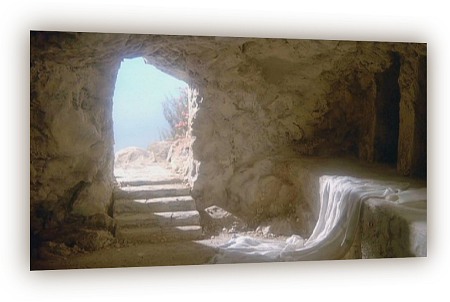inside_empty_tomb
During the 1992 presidential campaign, candidate Bill Clinton posted a sign in his office that read, “It’s the economy, stupid!” The purpose of these words was to remind him to focus on the economy as he believed that to be the winning issue in his quest to be president.
Similarly, if someone were to ask me why I believe what I do, I would simply say, “It’s the resurrection!” This is the foundation of my faith. My hope stands or falls upon its validity. As the apostle Paul said in 1 Corinthians 15:19, followers of Christ “are of all people most to be pitied” if Jesus did not rise from the dead and as a result we only have hope in this life.
The resurrection is the bedrock of my faith upon which all the other blocks fit and find their meaning.
Because Jesus physically walked out of the grave, I have hope for all eternity and it adds certainty to what I believe. The resurrection is the bedrock of my faith upon which all the other blocks fit and find their meaning.
The Centrality of the Resurrection
Lee Strobel, an avowed atheist at the time, accurately recognized that if he could disprove the resurrection, he could discredit Christianity once and for all. When his wife became a believer in Jesus, he set out on a two year quest to prove that her faith rested upon a hoax. Strobel, an investigative reporter for the Chicago Tribune at the time, employed all his skills and resources into disproving Jesus’ resurrection. After extensive research and countless hours examining the evidence he amassed, Strobel realized he could not dispute it. He ended up asserting his faith in the very thing he had worked so hard to disprove.
After giving his life to Jesus, he wrote the book Case for Christ and since then Strobel has become a world famous speaker as well as author verifying the claims of His Savior.
J. Warner Wallace is a highly recognized police detective with the Los Angeles Police Department. Some of the cold cases he has solved have been featured on NBC’s Dateline. He became famous as a result of his ability to discern the validity of statements made by witnesses, which in many instances led to the solving of the crime.
One day Wallace began to wonder what would happen if he applied the same successful tests he used of witnesses in criminal cases to the Gospel accounts of the life of Christ. What he discovered radically changed his life; he followed the path of Strobel in turning from atheism to saving faith in Jesus.
Wallace later wrote a book entitled Cold Case Christianity demonstrating why the Gospels are reliable witnesses, especially in regard to the resurrection of Jesus. He found that the Gospel writers passed all the tests he used to determine the validity of witnesses in all his other cases. We can trust these writers.
Why is the Resurrection so Crucial to Christianity?
Lee Strobel was correct in his initial assumption that if he could disprove the resurrection, he could debunk the Christian faith. Why is it so critical to our faith as believers?
During His ministry, Jesus made many radical claims. As recorded in John 10:30 He said, “I and the Father are one.” The Jews who heard these words immediately picked up rocks with which to stone Him to death. They recognized He was claiming equality with the Lord God of the Old Testament and such outrageous blasphemy could not be tolerated.
Besides claiming to be God, Jesus also repeatedly predicted His death and the timing of His resurrection. In John 2:19 he said, “Destroy this temple, and in three days I will raise it up.” Although misunderstood at the time, it later became clear he was talking about his body as the temple that would be raised in three days. Matthew 17:22-23 records these words from Jesus, “The Son of Man is about to be delivered into the hands of men, and they will kill him, and he will be raised on the third day.” Jesus clearly predicted his death as well as the timing of His resurrection.
Do you see how all of His claims are tied into the validity of His resurrection? He claimed to be God. If His bones are still in a grave somewhere in Israel, it means He was a liar. Everything He claimed rests upon the validity of His promise to rise from the dead on the third day. If Jesus was wrong about that, how can we trust him regarding anything else?
However . . . since He indeed walked out of the grave on the third day, this changes everything. He can absolutely be trusted in all that He said.
The evidence is clear; Jesus rose from the dead on the third day. His grave is empty. Opponents of Christianity do not deny the historicity of the empty tomb, but instead seek to prove theories to explain it. Lee Strobel, as an atheist, sought in vain to explain away the empty tomb as he realized he could not dispel the fact that it was indeed empty when the women arrived early that morning.
Jesus is the only person ever to accurately predict His death as well as the precise time that He would rise from the dead.
My purpose in writing these series of articles on the resurrection is not to prove the historicity of it, but to rather show why it matters in the foundation of my faith and why I believe what I do as the result of it. If you desire to read about the proofs for the resurrection, the books I previously mentioned in this article by Strobel and Wallace are great resources. The book Who Moved the Stone? by Frank Morrison is an older but also great book in this regard. A blog site called “Reasoned Cases for Christ” is also an excellent resource.
Because I know with absolute certainty that Jesus walked out of the grave with a physical body, I not only have hope in His return for me, but also confidence in His words. This is at the heart of all I believe.
Jesus is the only person ever to accurately predict His death as well as the precise time that He would rise from the dead. Because of this, He can be fully and absolutely trusted. We will examine this further in part 2 as we continue look, one step at a time, at how Jesus' resurrection impacts our faith as well as our confidence in him.
Stay tuned . . . .




 As I sat in class the first day, I begin to realize it was not what I expected. I should have dropped the course and signed up for another one. But I delayed in deciding upon an alternative and ended up stuck in the class.
As I sat in class the first day, I begin to realize it was not what I expected. I should have dropped the course and signed up for another one. But I delayed in deciding upon an alternative and ended up stuck in the class. Of all the late night comedians I watched over the years, I liked Johnny Carson the best. I liked his humor and still remember several of his skits.
Of all the late night comedians I watched over the years, I liked Johnny Carson the best. I liked his humor and still remember several of his skits. Fake news: it’s a term we hear every day and probably use ourselves. Whether you come from a liberal or conservative perspective, you likely accuse the other side of taking its cues from fake news.
Fake news: it’s a term we hear every day and probably use ourselves. Whether you come from a liberal or conservative perspective, you likely accuse the other side of taking its cues from fake news. I need the message of Habakkuk this morning!
I need the message of Habakkuk this morning!